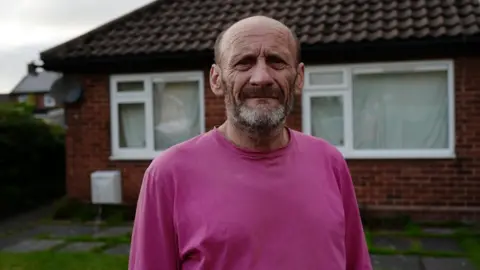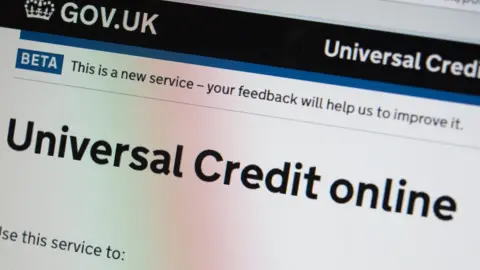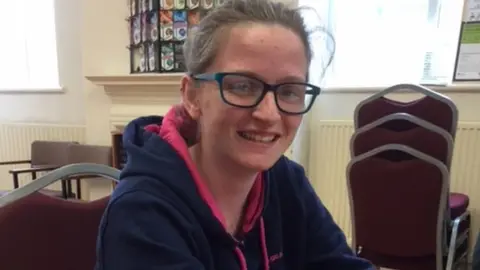Universal credit claimants 'struggling to cope'
 BBC
BBCUniversal credit is setting up some claimants "to fail", charity staff have told BBC's Panorama.
Since October 2017, the Department for Work and Pensions says 60% of eligible new claimants have been given an advance or loan to help them manage the five-week wait for their first payment.
The DWP deducts money from claimants' monthly benefit payment to repay this, as well as other debts they might have.
But after deductions are made, many say they are "struggling" to cope.
Housing charity Shelter says deductions for rent arrears are now double what they were under the old system.
The DWP says they have put safeguards in place to make sure repayments are affordable.
When universal credit was first announced in 2010, the then Work and Pensions secretary, Iain Duncan Smith, said it would replace a "complex, outdated and wildly expensive system".
It combined six benefits - child tax credit, housing benefit, income support, jobseekers' allowance, employment and support allowance and working tax credit - into one.
The government said the new system was designed to make work pay and encourage people, some of them the most vulnerable in society, to manage their own finances.
Flintshire in north Wales was one of the first areas to test the new system.
Last year, BBC Panorama visited the area and found people struggling to adjust.
Since then, the government has made changes and Panorama has returned to see how claimants are managing.

A year ago, Keith, who has mental health problems, was at risk of losing his home.
Universal credit encourages people to manage their own finances - including making their own rent payments - but he was struggling to cope and was behind with the rent on his council house.
Today, Keith has managed to hold onto his home after housing charity Shelter helped him change the way his benefits are paid.
The housing element of his benefit cheque now goes direct to his landlord, the council.
He is one of 2.6 million people on universal credit across the country
By the end of 2023, the Department for Work and Pensions says the system will be fully rolled out
It expects some seven million households to be claiming the new benefit.
Double deductions
To repay the debts Keith built up to cover his rent, he has money deducted from his universal credit payments every month.
As a result, he has less to live on. He told BBC Panorama: "It's a struggle".
Victoria Tomlinson, the Shelter advisor who helped Keith with his rent arrears, says the system is routinely taking double the deductions compared to what happened previously.
She told Panorama that tenants with arrears should pay them back, but added, "you can't make somebody pay something when they don't have it". If the repayments are too high "then you're setting them up to fail".
The programme met others who say they too are struggling with debt under universal credit.

Helen Barnard, deputy director of policy and partnerships at the Joseph Rowntree Foundation, told the BBC many claimants can be out of pocket from the start because they have to wait for their first payment.
"This all starts really with the fact that there is a minimum five-week wait at the beginning of your claim before your income comes through, so what's offered is an advance - which is a loan," she said.
"So what that does is pulls people into debt right at the beginning of their claim."
Rebecca and her young family moved into a council flat in north Wales in February last year and couldn't afford a lot of the basics for their new home
Her partner is a chef but his work is irregular so the couple depend on benefits.
Family help
"We needed everything. The only thing we had was a bed and a cot, that was literally it.
"So I reached out to universal credit and I was like, well, I'm going to have to get a loan out," Rebecca told the BBC.
She secured an advance and now around £90 is deducted from her benefits every month to repay it, and other debts.
The couple say this leaves them without enough money at the end of every month and they have to turn to Rebecca's family for help.
The DWP says it has put safeguards in place to make sure repayments are affordable, adding that claimants can contact them to negotiate lower payments and have 12 months to pay back any advances.
But Ms Barnard says that unlike financial institutions, "the Department of Work and Pensions doesn't have any standard affordability assessment" and the system "assumes" that the person applying for an advance understands how it works.
The DWP says that many tenants on universal credit have pre-existing rent arrears, but the proportion of people with arrears reduces over time.
Panorama: Universal Credit - One Year On with Catrin Nye airs on BBC One at 7.30pm, on Monday 9th December.
